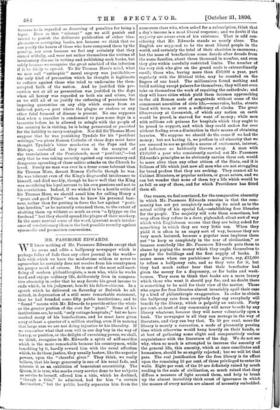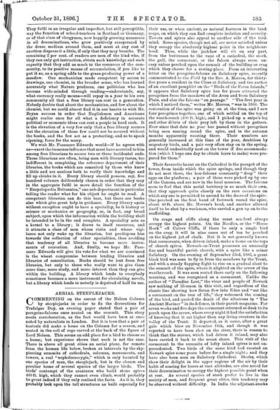MR. PASSMORE EDWARDS.
WE know nothing of Mr. Passmore Edwards except that he owns and edits a halfpenny newspaper which is perhaps fuller of fads than any other journal in the world— fads with which we have the misfortune seldom or never to agree—but he certainly does not receive from his countrymen his proper meed of esteem. He is one of the most self-sacri. ficing of modern philanthropists, a man who, while he works hard and enjoys ordinary life, deliberately lives in compara- tive obscurity in order that he may devote his great income to ends which, in his judgment, benefit his fellow-citizens. In a speech which he delivered on Saturday at Dulwich he ad. mitted, in deprecation of a still more remarkable statement, that he had founded some fifty public institutions; and to " found " means with Mr. Edwards to provide either the whole or the greater portion of the cost for "plant." Some of his institutions are, he said, "only cottage-hospitals;" but we have marked many of his benefactions, and he must have given away at least a quarter of a million sterling, even if in naming that large sum we are not doing injustice to his liberality. If we remember what that sum will in our day buy in the way of luxury, or position, or the delight of exercising power, we shall, we think, recognise in Mr. Edwards a spirit of self-sacrifice which is the more remarkable because his countrymen, while benefiting by it, hardly reward him with the usual affection which, to do them justice, they usually bestow, like the superior powers, upon the "cheerful giver." They think, we really believe, that his large generosity is one of his usual fads, and tolerate it as an exhibition of benevolent eccentricity. The Queen, it is tree, who marks every service done to her subjects as service to herself, offered him a title, which he declined, "though a title," he admitted, had for him "a certain fascination;" but the public hardly separates him from the numerous class who, when asked for a subscription, think that a day's income is a most liberal response; and we doubt if the majority are aware even of his existence. That is odd con- sidering that Mr. Edwards stands so nearly alone. The English are supposed to be the most liberal people in the world, and certainly the total of their charities is enormous ; but the mass of benefactions come decade after decade from the same families, about three thousand in number, and even they give within carefully restricted limits. The number of the very rich who give on the grand scale is extraordinarily small; those who, having more than 250,000 a year, part regularly with the Biblical tithe, may be counted on the fingers of one hand. The millionaires found nothing and build nothing except palaces for themselves; they will not even take on themselves the work of repairing the cathedrals; and they will leave cities which yield them incomes approaching to the old Roman scale of magnitude without some of the commonest amenities of civic life,—reservoirs, baths, streets lined with trees, or even a sufficiency of clocks. The great Observatory at Greenwich, of which any nation on earth would be proud, is starved for want of money; while men with millions ask guineas for hospitals which they ought to be proud to support, and which they could endow for ever without feeling even a diminution in their means of obtaining luxuries. We suppose we should do the same if we had the money ; but not having it, we profess in all sincerity that we are amazed to see so prolific a source of excitement, interest, and influence so habitually thrown away. A. man with £100,000 a year who consistently carried out Mr. Passmore Edwards's principles as he obviously carries them out, would be more alive than any other citizen of the State, and it is fullness of life which just now all men who are not struggling for bread profess that they are seeking. They cannot all be Cabinet Ministers, or popular authors, or great actors, and we can but wonder that none of them try a life which would be as full as any of these, and for which Providence has fitted them all.
One reason, we feel convinced, for the comparative obscurity in which Mr. Passmore Edwards remains is that the com- munity has not yet completely made up its mind as to the actual utility of his special fad,--establishing free libraries for the people. The majority will vote them sometimes, but very often they refuse in a dour, pigheaded, silent sort of way which with Englishmen means that they are being asked for something in which they see very little use. When they yield it is often in an angry sort of way, because they are very much lectured, because a popular man implores them not "to keep so completely in the rear of civilisation," or because somebody like Mr. Passmore Edwards puts them to shame by paying the money which they ought themselves to pay for the buildings and the first supply of books. It seems mean when one parishioner has given, say, 212,000 to refuse a halfpenny rate, and so they vote for it, but they had mach rather hear that their benefactor had given the money for a dispensary, or for baths and wash- houses. They seem to think that books are a mere luxury which those who want it should pay for, and no doubt there is something to be said for their view of the matter. Those who argue for free libraries almost invariably spoil their case by a kind of philanthropic exaggeration. In order to obtain the halfpenny rate from everybody they say everybody will benefit by the library, which is palpably an untruth. Forty per cent. at least of any community will never benefit by any library whatever, because they will never voluntarily open a book. The newspaper is all they can manage in the way of literature, and they can buy that. To 50 per cent, more the library is merely a recreation, a mode of pleasantly passing time which otherwise would hang heavily on their hands, or at best of gathering some slight and comparatively useless acquaintance with the literature of the day. We do not see why, when so much is attempted to increase the amenity of the general life, this amenity, which at once conciliates and humanises, should be so angrily rejected ; but we will let that pass. The real justification for the free library is its effect upon the remaining 10 per cent. of those privileged to enter its walls. Eight per cent. of the 10 are definitely raised by much reading in the scale of civilisation, so much raised that they diffuse a measure of light around them, and help to break up the almost incredibly thick crust of ignorance in which the masses of every nation are almost of necessity embedded.
They fulfil in an irregular and imperfect, but still perceptible, way the function of school-teachers in Scotland or Germany, or of that class of clergymen, now happily growing numerous in all denominations, who grow positively exasperated by the dense medium around them, and must at any cost of exertion disperse it a little, if only that they may breathe. The remaining 2 per cent, of readers are men of the kind who, if they can only get instruction, obtain such knowledge and such capacity that they add as much to the resources of the com- munity, to its positive means of accumulation, if you like to put it so, as a spring adds to the grass-producing power of a meadow. One mechanician made competent by access to .drawings, one chemist, in the broader sense, who has learned accurately what Nature produces, one politician who has become wide.minded through reading—understands, say, what currency really means—will repay in a year to his own community all that a free library can cost in a generation. Nobody doubts that about the mechanician, and few about the chemist, but we could almost find it in our hearts to wish Mr. Bryan success in order that Englishmen and Americans might realise once for all what a deficiency in accurate political or economic ideas can cost a people in hard cash. It is the elevation of a very few only that a free library secures but the elevation of those few could not be secured without the books, and the few act as a protecting, and so to speak ripening, force for the many.
We wish Mr. Passmore Edwards would—if he agrees with us—exert the immense influence that must have accreted to him among free librarians to secure two or three incidental ends. Those librarians are often, being men with literary tastes, too indifferent in completing the reference department of their libraries, the books which are consulted by those who know a little and are anxious both to verify their knowledge and fill up chinks in it. Every library should possess, say, five hundred volumes deliberately chosen in order that they may in the aggregate fulfil in more detail the function of the " Encyclopmdia Britannica," one sub-department in particular telling the reader what for his object he ought to read. A competent librarian can do this best, but there are books also which give great help in guidance. Every library again without exception ought to have a speciality, be it history or science or mechanics or geography, or, in fact, any broad subject, upon which the information within the building shall be intended to be in the end complete. A speciality acts as a kernel to a library ; it draws to itself resources, and a attracts a class of men whose visits and whose vigi- lance not only wake up the librarian, but predispose him towards the collection of other specialities, thus avoiding that tendency of all libraries to become mere instru- ments of recreation. And, finally, we hope Mr. Pass. more Edwards will give his vote for what we are convinced is the wisest compromise between lending libraries and libraries of consultation. Books should be lent from free libraries, but only to those who really want to give them more time, more study, and more interest than they can give within the building. A library which lends to everybody sometimes becomes a mere instrument for circulating novels, but a library which lends to nobody is deprived of half its use.











































 Previous page
Previous page